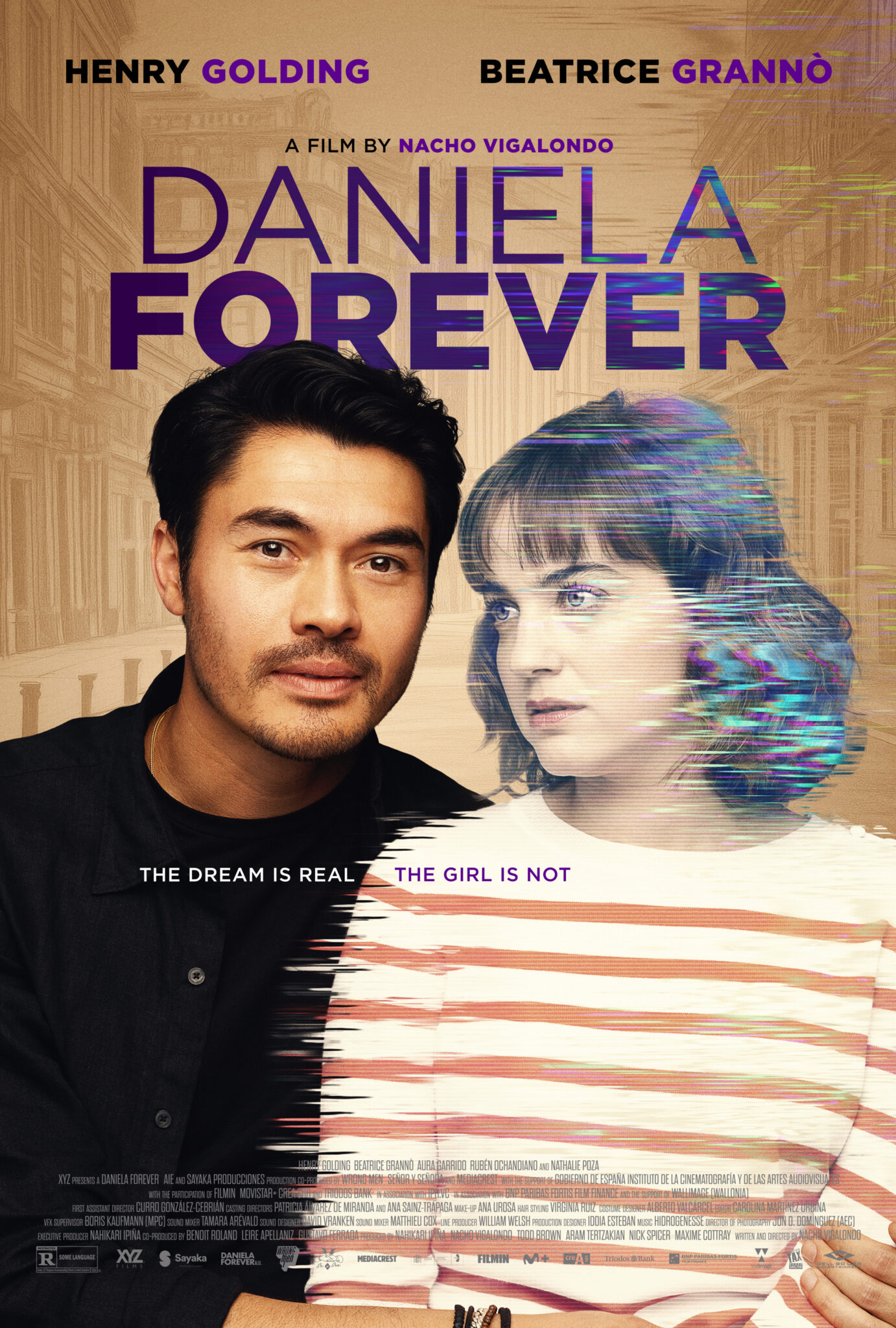Interview by Paul Salfen
In the world of cinema, few films dare to blend the raw ache of loss with the surreal haze of science fiction quite like Daniela Forever. Directed by the visionary Nacho Vigalondo—known for his mind-bending hit Colossal—this poignant tale follows Nicolás, a man shattered by the death of his girlfriend Daniela. Consumed by grief, he turns to an experimental sleep therapy that promises to simulate reality, allowing him to relive moments with her. But as dreams bleed into memories, Nicolás must grapple with the true cost of healing: learning to let go. It’s a sci-fi journey through love, loss, and illusion that leaves audiences pondering the boundaries between holding on and moving forward.
I recently sat down with Beatrice Grannò (The White Lotus), the film’s captivating star, to discuss this emotional rollercoaster. Fresh off her breakout role in The White Lotus, Grannò brings a depth and vulnerability to Daniela Forever that elevates its themes of sorrow and self-discovery. Our conversation revealed not just the film’s profound impact, but also Grannò’s infectious passion for storytelling—and yes, even a bit of on-set hilarity amid the heartbreak.
From the outset, Grannò described the movie as “a collage of different styles and emotions.” She emphasized its uniqueness: “I love doing this movie; it was so creative, so unique.” Despite the heavy subject matter, the production sounded like a dream. “We really did have a great time,” she shared. “The combination of Nacho Vigalondo and Henry Golding was incredible. We had such a great time, even though we were making a very sad film. We were always laughing on set.”
That laughter, it turns out, was key to navigating the film’s darker tones. Grannò praised Vigalondo’s directing style: “He has a way of working. He wants people to really take things very lightly. He always wanted to make a joke about whatever was happening. And through that, he was able to access much more difficult conversations.” Set in the stunning backdrop of Madrid, the experience felt worlds away from the grief at the story’s core.
At its heart, Daniela Forever isn’t just about mourning—it’s a nuanced exploration of how grief can turn inward, making the bereaved an unwitting oppressor. “It’s a story about grief, but it’s very interesting because it’s not really about the victim,” Grannò explained. “The person who’s experiencing grief becomes an oppressor as well. So it’s about that selfishness of not being ready to let someone go, and holding tight to that person to a point that that person has no freedom.” She added, “When you lose someone, you’re not ready to be happy unless you let go of that person. And letting go means letting that person be whoever she or he wants to be.”
Grannò’s insights stem from a place of genuine connection to the material. “You can tell that it came from an honest place,” she said of Vigalondo’s script. For her, the film transcends typical sci-fi tropes, leaning into “magic realism.” She hopes viewers embrace its multifaceted nature: “I hope they have fun because it has comedy moments where you’re not quite sure whether you should laugh or cry. And I would just say, just laugh… Don’t feel awkward.” Ultimately, she sees the film as “a caress of nostalgia,” inviting audiences to feel the energy of presence and absence: “How does it feel to have that moment? Someone was alive, and someone is gone.”
This role marks a milestone for Grannò—her first English-speaking part. “It means a lot to me on a career level,” she reflected. “I’ve never done that before, and it was amazing to work with Henry Golding.” Coming from a background in drama school in London, where she honed her craft in comedy, Grannò is drawn to emotional depths. “I’m very drawn into dramas and emotional films,” she said. “I really hope that this will open up a bit more to that. I’m always very happy to make films that are important somehow.”
Grannò’s journey hasn’t been without its challenges. Likening acting to fishing—”You have to be very patient, and you have to stay still… You cannot get distracted”—she credits The White Lotus with expanding her horizons: “It was one of the biggest things I’ve done; it really opened up my perspective as an artist.” For aspiring actors, her advice is straightforward: “Go to drama school… It makes you a happier actor because this job is always up and down.” And always, “follow your gut.”
Maintaining a success mindset amid the industry’s highs and lows is crucial, especially for creative types. “With myself, it’s always love and hate,” Grannò admitted. “Sometimes I’m really aligned with who I am; sometimes I’m not. The game is to be able to accept those moments… and say that it’s okay that I’m angry at myself.” She grounds herself by remembering the essence of her work: “Your job is about entertaining the other person. It’s not really about you. It’s about making them forget whatever they’re going through or giving them a little bit of dreams.”
Looking ahead, Grannò is tight-lipped about specifics but teased exciting developments: “I can’t say that yet, but I’m excited.” Music, however, is a passion she’s eager to pursue further. “I’m working on my music… My dream would be to dive more into the music industry. I always saw music as the tail of my career as an actress, but to be able to combine it—that’s really exciting.” Having already blended the two in The White Lotus, she’s poised for more.
Daniela Forever isn’t just a film—it’s a mirror for anyone who’s loved and lost. Through Grannò’s eyes, it’s a reminder to laugh through the tears, embrace the magic in the realism, and perhaps, find the courage to let go. Catch it in theaters and prepare for a journey that blurs the line between dream and reality. As Grannò aptly put it, “Just let it in.”

